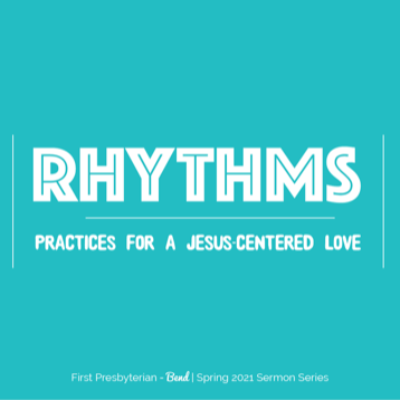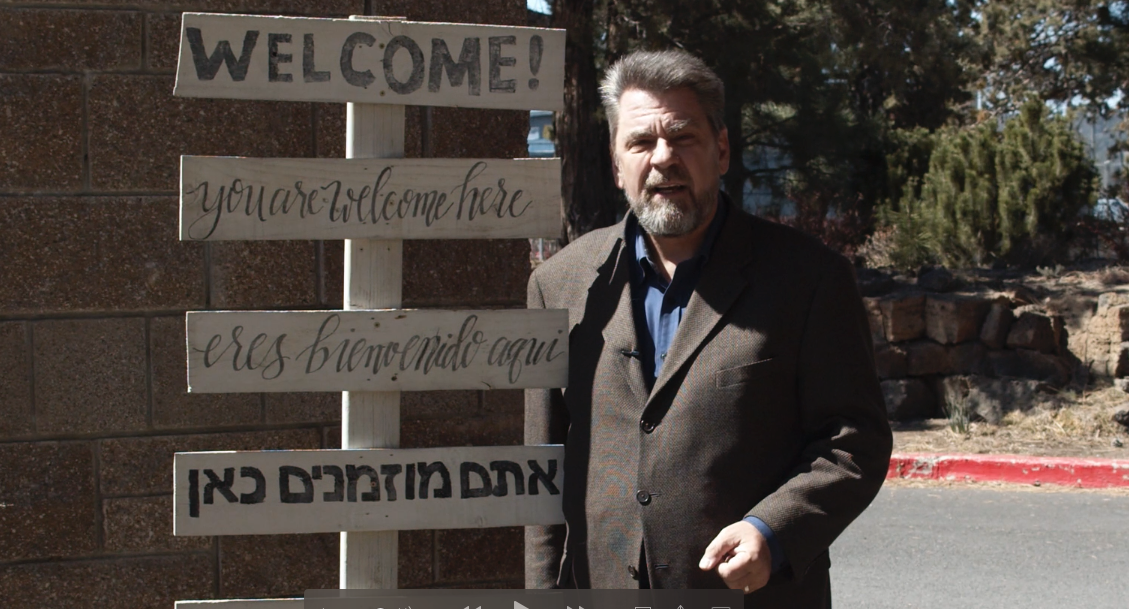Rhythms of Generosity. Practices for a Jesus-Centered Love.
A Part of the Series:
Rev. Dr. Steven Koski
Other Articles in:
April 18 Sermon, Rhythms of Generosity. Practices for a Jesus-Centered Love. Rev. Dr. Steven Koski
It’s April National Poetry Month, so of course, I want to begin by sharing a poem and one of my favorite poems is by an Israeli poet, Yehuda Amichai, called The Place Where We Are. Right. From the place where we are right, flowers will never grow in the spring, the place where we are right is hard and trampled like a yard. But doubts and loves dig up the world like a mole, a plow. You know, the poem suggests suggests nothing can grow between us when we insist on meeting each other, speaking to each other from the place where we are right.
You know what, if we were willing to to soften our certainty for the sake of peace, what if we placed a higher value on on being in relationship than being right?
Letting go of being right, doesn’t mean you’re wrong. It means you’re choosing to love creating a brave space that can hold the tension of difference and disagreement as you try to find common ground, as you try to find a shared humanity.
You know, I’ve said many times conflict is inevitable. Conflict is the stuff of life. Combat is optional. The goal isn’t to disagree less. The goal is to disagree better. Instead of stomping around, hardening the ground in the places we are, where we are, right. What if we tried to find common ground, you know, where we can till together to help grow a new way of being community?
Our differences and even our disagreements can be Life-Giving. If they’re rooted in the rich soil of our shared humanity. You know, it’s no accident that that humous the organic component of soil. And humility. Come from the same root word. Humous helps plants grow. Humility helps relationships, community love grow. The recently watched a TED talk by Ali Abu Awwad, a Palestinian activist, and the TED talk was called Painful Hope. Ali has seen the suffering of the Jewish people.
He’s also seen and experienced in his own body. The suffering of the Palestinian people, his story is compelling because his experience of compassion. Saved him from being lost in the endless cycle of retribution and and revenge. And one of the many stories he tells. Is it the first time he saw an Israeli cry? It was at a bereavement group that they were hosting in his family home. And he was amazed, he said, because. He never imagined that Israelis cried.
He only thought of Israelis as the enemy. He said, I was convinced that I am the only victim and they are the enemies. And suddenly you see them as a human being when you see them cry. Ali’s brother was killed by an Israeli soldier in his TED talk. He said he had had this growing realization that. But no amount of suffering he could create and others. Would relieve his pain or or bring his brother back. So instead of living in anger and retaliation.
He decided to work for a new and a different kind of future. So he’s working to build a nonviolent movement to get Israelis and Palestinians to work together to to build relationships. His unlikely partner in this work is Rabbi Hannan Schlesinger, who actually has a similar story about.
Realizing that Palestinians. Or are more like him then different than him. Rabbi Schlesinger, describe the first time that that he intentionally went to meet a Palestinian, you know, his wife told him not to go and it’s too dangerous, she said, but he went and he saw Palestinian kids wearing shirts that said peace.
And he thought, how strange. Because Palestinians are not for peace, he thought to himself, you know, they they just throw rocks, they they hate us. But here we’re Palestinians, Palestinian children. Who are for peace? And realize that that they live so close together. But they live so far apart. You know, sometimes they’re only separated by a fence or a wall, but. On that day, he saw that they were separated by so many of their assumptions and so many of their fears on that day, he began to know real people, to see real people, and his life began to change.
Now, Ali and Hanon traveled together telling their stories, trying to foster a grassroots movement of a mutual understanding and nonviolence. When you think about it, imagine the possibilities. If we realized there is no us and them. There is only we. Imagine if we moved from the place where we are, right? And with a heart of humility. Tried to see God in the other turned our clenched fists. Into open hands. Relationship expert John Gottman says that in relationships.
We are moving in one of three directions at all times. We are moving away away from each other or we’re moving against each other. Or we’re moving toward each other. I mean, every thought we have, every behavior either joins you. Or separates you? You know, it says in Second Corinthians five. It says that the spirit of God was in Jesus. Reconciling the world toward God’s heart, moving people toward God. And we have been given that same ministry of reconciliation.
What that means is that the spirit of God was present in Jesus. Moving toward people in love, joining what was divided, healing, restoring what was broken. So how would our faith change? If we understood that that forgiveness. Heeling. Reconciliation. Are the primary movement. Of God’s spirit. During April and May, our theme, our theme is rhythm’s. Practices for a Jesus centered love. You know, over the next few weeks where we’re going to focus on some of the rhythms and practices of what it means to live and love in the way of Jesus, you know what it looks like to embody the spirit of love that was present in Jesus, the spirit of love.
We proclaim that Easter that could not be defeated. The spirit of love that doesn’t move away or against. But as always, leading. And moving us towards others with humility and love, often moving us in places we may not want to go.
In his Sermon on the Mount, in the Gospel of Matthew Jesus.
Jesus says these. Remarkable words. If you are offering your gift at the altar. And there, remember that, that your brother or sister has something against you. Leave your gift there in front of the altar. First. Go and be reconciled to them. Then come and offer your gift. We’ll think about the implications of that just for a second, the implications for our church budget budget if we actually took Jesus seriously.
I mean, if you have a conflict with anyone, you first. Need to go to them and seek to make it right. And only after you seek reconciliation. Do you then come back to worship? And make your offering. Can you imagine? Take a second. Think about someone with with whom you have a conflict. Or maybe someone with whom you just vehemently disagree, they see the world just so differently than you do or perhaps someone you. You you judge harshly.
Now, imagine. Imagine intentionally moving towards those people. With humility and love. Listening, trying to understand, seeking common ground connection. Seeking reconciliation. And imagine doing that. Before participating in worship. I’m guessing that I just pretty much guaranteed. That will have no one in worship next week, OK? I’m kidding. Sorta. Imagine what might be possible if if we took Jesus seriously. What might be possible if everyone in our are very angry and divided country who claim to be Christian, who claim to be followers of Jesus?
Purpose purposely sought out just one person with whom they had a conflict with and tried to repair that that one relationship. I mean, imagine what might be possible if we intentionally move towards people who are different than we are, you know, those who think and believe and look and and embody different things than us. And with a humble heart. We look to see God in the other, we initiated brave conversations. We were willing to listen to their stories.
Imagine if we took off our defensive armor. And with humility. We were willing to learn and grow. It’s difficult to imagine, right? But when we live in the way of Jesus. When we embody the spirit of love that was present in Jesus, it’s dangerous because that spirit moves us towards others. That spirit moves us in the direction of reconciliation, that that spirit often moves us in places we don’t want to go. And maybe Jesus is saying in this passage of scripture that that’s part of our worship.
So imagine it’s Sunday morning, you just woke up you a plan, do you plan to attend worship in a couple hours, what it before you attend worship?
We searched our hearts for where there’s conflict. Where there’s judgment, where there’s bitterness, where there’s hatred, where we either feel distant or against someone.
What if you send an email? Or a text to someone you’re in conflict with at asking for an honest conversation in which you desire to seek repair.
What if you what have you reached out to someone who holds very different views than you do? Saying, you know, that you disagree on many things. But you want to be in relationship with them. What if you spend some time thinking about how you might use your voice? In public spaces as a peacemaker, you know, lifting a voice of love as a counter testimony to the many voices of anger and hate. What might be possible if we treated the time between weekly worship services?
As the time to get right with each other, the time to make repairing broken relationships a weekly priority. The time to resist the forces of polarization that try to pull us apart. And instead, we intentionally build bridges wherever we can. That would be something, wouldn’t it? You know, it may not change our larger culture overnight. But I can’t help but think it would change us and play a part in healing the corrosive anger and hate that’s all around us.
I can’t help but think.
That’s the kind of worship Jesus had in mind. I received an email this week sharing a story about that took place last November during the election, and I want to share it with you.
It said in this time of hostility and polarization with when people are being driven further and further apart. I want to share something that reminds us. To listen to our better angels. My husband likes to work, and yesterday he passed two houses in our neighborhood that had posted yard signs for the candidate my husband and I vehemently oppose.
And my husband noticed one sign was vandalized with graffiti and the other sign had been crushed and destroyed. My husband stopped, got off his bike, knocked on the door of each house. Told the owners that that he was a supporter of the other political party. And he said he was sorry that their signs had been damaged. And that he wanted to buy them new ones, new signs, he reiterated that that no one should treat a neighbor this way.
I confess, I gulped hard when when I heard that my husband actually offered to buy do yard signs. But then I thought. How would I feel if the situation was reversed? And someone did the same for us. My husband said he hoped it would help them rethink how they felt about their neighbors, perhaps diffuse some of the anger, maybe even start a brave conversation. After all, the world can only be changed one brave conversation at a time.
Friends, may we may we practice the rhythms of Jesus? The rhythm that moves us toward one another in a spirit of humility and love. May we practice resurrection, trusting the Lord that could not be defeated? Is the love that can heal our lives, our nation, our world, and may we remember that we came from that love, we are made by that love. And we are here. To live that love. May it be so.



